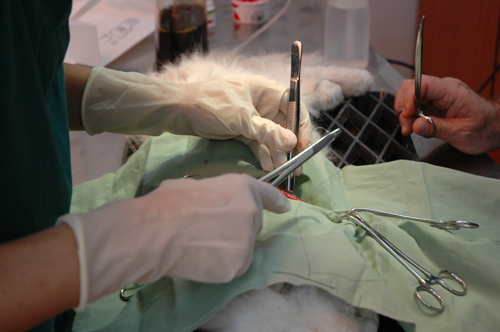
Soft tissue surgery includes surgeries not associated with bone. Examples of some soft tissue surgeries and their benefits are listed below.
Probably the most common soft tissue surgery we perform is the removal of masses or ‘lumps’ from animals. Most of these masses, once removed and tested, are benign (non-harmful); however, occasionally they are more serious. Early removal and accurate diagnosis of a tumour is necessary to improve the outcome in your pet, especially if the mass is cancerous.
Lacerations are also common in pets and suturing will reduce the chance of infection, improve healing time and reduce scarring. Please keep in mind that the sooner a wound is cared for the more likely it can be closed surgically with success.
Tearing in your pet’s eyes can mean an infection is present or it may be a sign the cornea (outer layer of the eye itself) has been damaged. A damaged cornea may require soft tissue surgery to allow the cornea to heal faster with less scarring. Less scarring will improve the ability of your pet to see. In some animals, the cornea may be damaged by the eyelid hairs surrounding the eye. Surgical intervention involving the eyelid improves the comfort in these animals. It also reduces the chances of corneal scarring and enhances the animal’s vision in the long term.
Another common but unfortunate circumstance is when an animal ingests something that it shouldn’t, like a piece of fabric, tennis ball or plastic. These are all considered foreign bodies and there are times when surgical intervention is necessary to remove them. They can cause obstructions in the gastrointestinal tract and lead to severe consequences if not cared for appropriately.
Bladder surgery is also a common occurance. Dogs and cats can both develop bladder stones that are too large to pass naturally. Surgical removal can often be necessary. There are often dietary changes that need to be made post-operatively to prevent recurrance.
There are just a few of the many soft tissue surgeries that we perform at the Blue Cross Animal Hospital. All of the above procedures would take place under a general anesthesia. We will be sure to consult with every owner to determine when these procedures will be necessary for your pet.
